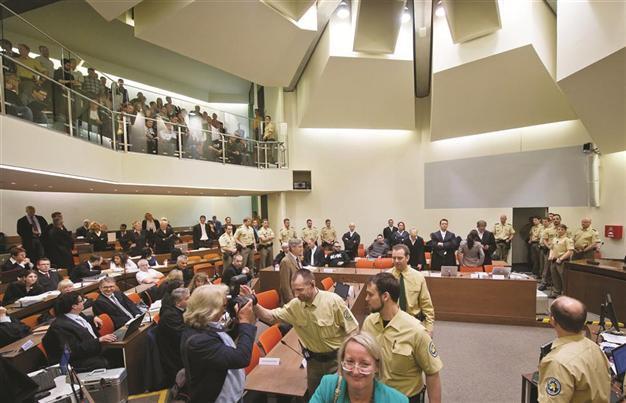Neo-Nazi probe is a peerless failure: German report
MUNICH

A general view of the courtroom as proceedings are resumed in the trial of Beate Zschaepe and four others allegedly involved in neo-Nazi racist murders. AA photo
An interim parliamentary inquiry report called the National Socialist Underground (NSU) investigation a “peerless failure,” as the landmark trial of alleged neo-Nazi Beate Zschape, and four others, continued in Germany after a week-long suspension.
The head of a German parliamentary committee assigned with identifying mistakes made during the investigations, Social Democrat Sebastian Edathy, submitted an interim report on May 13, with his final paper due this summer.
Although there was no indication that the state covered for or supported the group, Edathy spoke of a “peerless failure” during the investigation process of the NSU case, according to Deutsche Welle’s report.
“A shameful failure with many varying causes,” he said. The interim report criticized the intelligence agencies for underestimating the threat of right-wing extremism and for failing to convey its findings more publicly.
After asking witnesses about the shredding of potentially pertinent files in Cologne in November 2011, while the NSU was uncovered by chance following a botched bank robbery, Edathy admitted he had hit a dead end. It was not possible to ascertain whether the papers were trashed out of “pure stupidity” or out of a desire to conceal their contents, he said, adding, “That will have to remain open.”
‘Creativity of defense limitless’Meanwhile, the second hearing began with demands of the suspects’ lawyers to adjourn the trial due to the courtroom’s inadequacy.
No charges had been read out by noon as the defense and prosecutors traded arguments over the way that the hearing, taking place in the southern city of Munich, should proceed and where.
One of Zschaepe’s lawyers, Wolfgang Heer, demanded that the closely-watched trial be halted and moved to a larger room than the chamber that has only 100 seats for the public, half of them reserved for journalists.
He requested that “the trial be restarted in another courtroom which has sufficient capacity for the public, given the importance of this trial,” according to Agence France-Presse.
An exasperated state prosecutor, Herbert Diemer, retorted that “the creativity of the defense appears to be limitless,” after the defense team had also on May 6 accused the chief judge of being biased, sparking an eight-day delay.
The hearing - held under tight security, with almost 400 police stationed around the building - is one of Germany’s highest-profile trials in decades.
Zschape faces charges relating to 10 murders, eight of whom were citizens of Turkish origin. Another was Greek and the final victim was a German policewoman.
Zschape is believed to be one of the founding members of the NSU, a group that went undetected in Germany for over a decade. Four other people, accused of lending assistance to the NSU, are also on trial.
